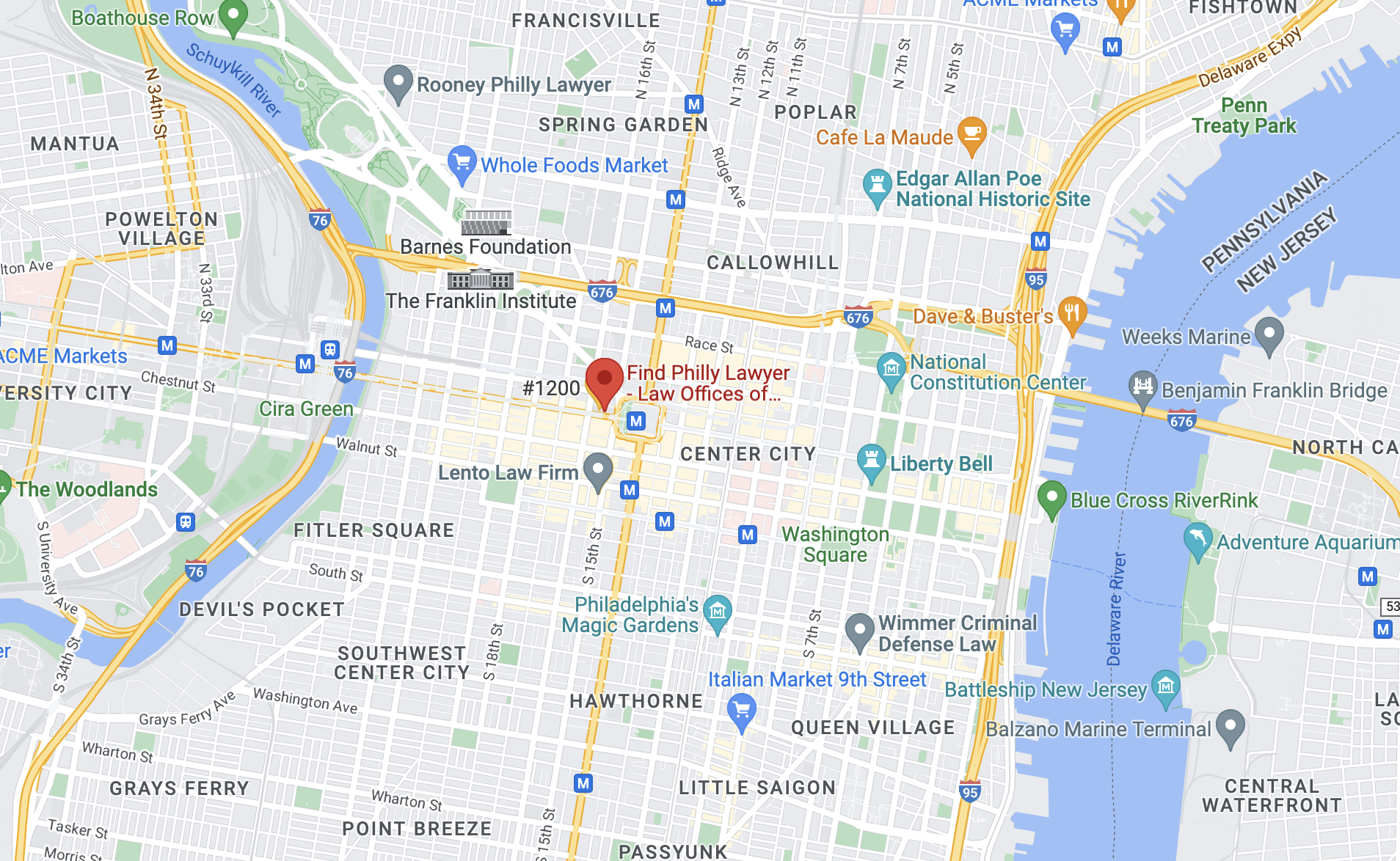Being arrested and charged with a crime is frightening under any circumstances. When the arrestee is your own son or daughter, the anxiety level can go through the roof. As a parent, you are no doubt feeling extremely concerned about how your son or daughter will be treated, what will happen in the days and weeks ahead, and whether there will be a record of juvenile delinquency that could hurt your child in terms of college admission, internship programs, and work opportunities. If your son, daughter, or grandchild has been charged with a crime in Philadelphia, it is critical that your family has the benefit of aggressive and experienced legal representation from an effective defense attorney.
The juvenile justice system follows different rules, standards, and procedures than the court system for adult defendants, so selecting a defense lawyer with prior experience specifically handling juvenile cases is critical. Philadelphia juvenile criminal defense attorney Lonny Fish has worked on thousands of criminal cases involving a wide range of misdemeanor and felony charges and understands the unique challenges and strategies that arise in cases involving juveniles. He also understands how overwhelming it is to go through Pennsylvania’s juvenile justice system. He will be there to walk your family through every step of the process with honesty, clarity, and compassion while guarding your child’s constitutional rights.
A criminal charge, no matter how minor, could have negative effects on your child’s future. Protect your child by making sure that your son or daughter has robust representation. For a free case evaluation concerning juvenile charges in Philadelphia, call The Law Office of Lonny Fish at (215) 826-3314 today.
Common Juvenile Offenses in Philadelphia
Like adults, juveniles can be charged with a wide array of crimes in Pennsylvania. Note that the juvenile justice system uses different legal terminology than the standard justice system. A crime in the juvenile justice system may be referred to as a “delinquent act.”
Most juvenile cases involve relatively minor offenses, such as summary offenses or misdemeanors, rather than serious violent felonies. Examples of delinquent acts that juveniles are commonly charged with include:
- Disorderly Conduct
- Driving Under the Influence of Alcohol or Marijuana (DUI)
- Drug Possession (Simple Possession)
- Graffiti (Criminal Mischief)
- Shoplifting (Retail Theft)
- Simple Assault
- Trespassing (Criminal Trespass)
- Underage Drinking
- Using a Fake ID
- Vandalism
Parents and juveniles sometimes assume that a juvenile charge is “not a big deal” or “nothing to worry about.” Unfortunately, that could not be further from the truth. Even if the charge is a summary offense or misdemeanor, it could still limit your child’s potential for growth and success later in life.
Your child could lose their ability to drive, own a firearm, work in certain fields, access government benefits, travel abroad, or join the military. If they are charged with a crime later in life, they could receive harsher penalties than they would have otherwise. Your child may even lose their immigration status, or be required to register as a sex offender, which can have permanent and catastrophic consequences.
At our criminal defense law firm in Philadelphia, we handle a broad spectrum of cases involving juveniles, ranging in severity from summary offenses to violent felony crimes. In addition to the charges listed above, other types of juvenile cases we handle include:
- Arson
- Burglary
- Drug Manufacturing
- Drug Sales
- Drug Trafficking
- Forgery
- Gang Activity
- Gun Possession
- Harassment
- Identity Theft
- Possession with Intent to Distribute (PWID)
- Rape
- Resisting Arrest
- Robbery
- Stalking
- Theft
- Theft from a Motor Vehicle
What Happens to My Child After Being Arrested in Philadelphia?
Getting the call that a family member has been arrested can be frightening. The experience may be even worse when you get the call that your child has been arrested. Rest assured that juveniles are treated very differently by the justice system than adults. Even so, you likely have a lot of questions about what happens to your child after they are arrested.
After being arrested, a juvenile may be temporarily detained by law enforcement. This detention is often brief and lasts long enough for the police to identify the juvenile, contact parents or guardians, and generally assess the case. In many cases, the police release the juvenile to their parents with instructions about how and when to attend the next hearing. However, some juveniles are detained for longer.
If the police want to continue holding a juvenile in their custody, there must be a detention hearing. According to 237 Pa. Code Rule § 240(C), if a juvenile is not released after arrest, they may be detained for no longer than 72 hours before a detention hearing must be held. At the hearing, the authorities must present evidence and information to a judge convincing them to detain the juvenile. Generally, juveniles may be detained if they are a flight risk, too dangerous to release, or they cannot return home for some reason.
Under 237 Pa. Code Rule § 1404, if your child is detained, they must have an adjudication hearing no later than 10 days after prosecutors file a petition against your child. The petition is the formal document stating why the authorities believe a juvenile is delinquent. If your child is not detained any further and released into your custody, the authorities may still file a petition, but an adjudicatory hearing does not have to happen for up to 45 days.
What Happens if My Child is Charged with a Felony in Philadelphia?
Juveniles who are charged with delinquent acts typically do not go through the same process as adults. However, there are some exceptions for extremely serious felony charges, such as murder.
Juveniles who are accused of murder in Philadelphia will be tried like adults, regardless of age. Juveniles in Pennsylvania may also be tried like adults if accused of any of the following offenses, whether actual or attempted:
Otherwise, juveniles generally go through their own court system, which tends to be faster and less formal than the system that processes adult defendants. It also uses different terminology, which can be helpful for family members to have some familiarity with. For example, instead of being “convicted” like an adult who pleads or is found guilty, a juvenile would be “adjudicated delinquent.”
Though an adjudication of delinquency is not technically the same as a criminal conviction, it can have similar collateral consequences, such as impacts on employment and housing opportunities. Instead of being sentenced to jail or prison, a minor who is adjudicated delinquent will generally receive penalties such as community service, supervised probation, driver’s license suspension, and, depending on the nature of the offense, mandatory treatment or counseling.
Depending on the case, deferred adjudication may be a possible outcome. If your son or daughter successfully complies with certain court rules and requirements for a set period of time, such as passing drug tests, the charges against your son or daughter can be dropped.
How Juveniles Might Be Tried as Adults in Philadelphia
While juvenile cases are usually handled within the juvenile justice system, some cases are transferred to adult court. You have likely heard about this kind of thing happening if you have read a news story about a juvenile offender being tried as an adult. This kind of treatment is typically reserved for more serious cases involving felonies or violent offenses.
A juvenile may be transferred to adult court at the request of prosecutors and after a transfer hearing. According to 237 Pa. Code § 390(A), prosecutors may file a request for a transfer hearing after a petition is filed but before the first adjudicatory hearing. A notice of the transfer hearing must be served upon the juvenile, their guardian, attorney, probation officer, and the lawyer for the Commonwealth.
The fact that a transfer hearing is scheduled does not mean your child will automatically be tried as an adult. According to 237 Pa. Code Rule § 394(C), attorneys for the Commonwealth must first establish a prima facie case that the juvenile in question committed a delinquent act that would be a felony if committed by an adult. Second, they prove by a preponderance of the evidence that transferring the juvenile to adult court would serve public interests.
There are also rules about what the court must find in order to transfer a juvenile to adult court. Under 237 Pa. Code Rule § 394(D), the court must find the following facts:
First, the court must find that the juvenile was at least 14 years old when the offense was allegedly committed. Second, the court must find that notice of the transfer hearing was properly served on all necessary parties. Third, the court must find that the prosecutor has met their burden of proof as discussed above. Finally, the court must find that there are reasonable grounds to believe there is no need to commit the juvenile to an institution for the mentally ill.
What Happens During an Adjudication Hearing or Juvenile Offenders in Philadelphia
If your child is tried in juvenile court, the trial is referred to as an adjudication hearing. This is a somewhat less formal version of a trial. Juveniles may be adjudicated delinquent (guilty) or not. According to 237 Pa. Code Rule § 406(A), the court will conduct the adjudicatory hearing without a jury. Only a judge may act as the fact finder.
The prosecutor has the burden of proving beyond a reasonable doubt that the juvenile committed the delinquent acts. This is the same burden of proof as in adult criminal trials.
Much like an adult criminal trial, you, your child, and their defense attorney may have the opportunity to speak up and defend the juvenile. If the juvenile is adjudicated delinquent, there will be another hearing where the court determines what happens to the juvenile and what kind of services they might be provided. This is called a disposition hearing. According to 237 Pa. Code Rule § 512(A)(1), the court may hear evidence from both parties that may be helpful in determining a disposition, including evidence that was not admissible during the adjudicatory hearing.
Philadelphia Juvenile Crime Defense Lawyers Can Help if Your Child Was Arrested
A criminal charge, such as shoplifting, property destruction, or marijuana possession, can derail even the most promising future. Ensure that your son or daughter’s rights will be aggressively protected by a skilled and respected attorney with a record of obtaining favorable case outcomes, like Philadelphia juvenile crimes attorney Lonny Fish.
Even if your child has been adjudicated delinquent, there may be ways to minimize the damage to your child’s future. Contact our attorneys to help determine if your child’s case is eligible for expungement. When juveniles’ records are expunged, they are sealed away by the courts and treated as if they do not exist and never existed. In a way, it is wiping the slate clean.
According to 237 Pa. Code § 170(4), a juvenile who has been discharged from court supervision may be eligible for expungement if at least 5 years have passed since they were discharged, they have not been convicted adjudicated delinquent for a felony or misdemeanor, no court proceedings that would seek a conviction or adjudication is pending, and the delinquent act on your child’s record is not otherwise ineligible for expungement. Alternatively, your child may be eligible for expungement if the prosecutor for their case consents to an expungement.
Contact Our Philadelphia Juvenile Defense Attorney for Help Right Away
At the Law Office of Lonny Fish, our legal team handles cases throughout Philadelphia, including neighborhoods in Center City, South Philadelphia, West Philadelphia, and North Philadelphia. If your son, daughter, grandchild, or younger sibling was arrested in Philadelphia, call for a free case review – (215) 826-3314.



 Liberty Law Team
Liberty Law Team  (215) 826-3314
(215) 826-3314 lonny@libertylawteam.com
lonny@libertylawteam.com





